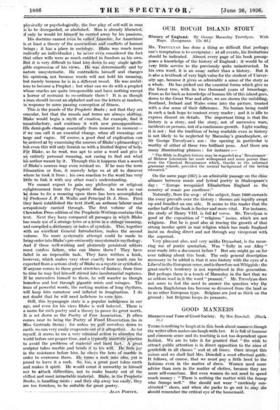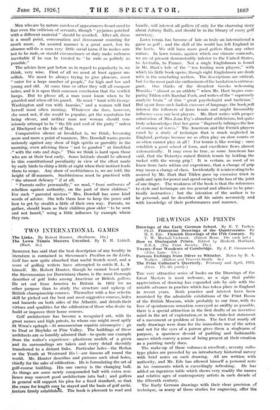GOOD MANNERS
Manners and Tone of Good Society. By Mrs: Dowdall. (Black, 5s.) TAE is nothing to laugh at in this book about manners though the writer often makes one laugh-with her. It is full of humour and common sense and its teaching is not too dependent upon fashion. We are to take it for granted that " the wish to attrael_public attention is in direct opposition to the aims of gentlefolk in all classes " and at all times. Orice Adeept this axiom and we shall flail Mrs. Dowdall .a most effectual guide. It follows, of course, that we must- pay a little heed to the fashions even in the matter Of dress. Women need more advice than men in the matter of clothes, because they 'are more self-conscious. But even women do not need to spend much money : " There is nothing the matter with the frump who frumps well." She- should not' wear " carelessly con- structed " shoes, and When she packs to go out to stay she should remember the critical eye of the housemaid.
- Men who are by nature careless of appearances do not need to fear even the criticism of servants, though " pyjamas patched with a different material " should be avoided. After all, dress is a small point, conversation and demeanour counting for much more. .An assured manner is a great asset, but its absence will do a man very little social harm if he makes sure not to be rude, or should circumstance or duty make rudeness inevitable if he can be trusted to " be rude as politely as possible."
• The advice here put before us in regard to popularity is, we think, very wise. First of all we must at least appear un- selfish. We must be always trying to give pleasure, must " cater for a large number of people," for high and low and 'young and old. At some time or other they will all compare notes, and it is upon their common conclusion that the verdict hangs. But to please all, a man must know when to be guarded and when off his guard. He must " hunt with George Washington and run with Ananias," and a woman will find 'herself most often running. Whatever she does, however, she must not, if.she would be popular, get the reputation for being clever, and neither man nor woman should con- sciously attempt to be " the life and soul of the party " unlesS at Blackpool or the Isle of Man.
, Comparative silence at breakfast is, we think, becoming more and more a point of manners. Mrs. Dowdall warns guests seriously against any show of high spirits or garrulity in the morning, even advising them " not to gambol " at breakfast
with the cats and dogs." This we think is hard upon those who are at their best early. Some latitude should be allowed to this constitutional peculiarity in view of the effort made by early birds to chirp a little at night when their instinct leads -them to mope. Any show of snobbishness is, we are told, the -height of. ill-manners. Snobbishness must be practised with ." the utmost delicacy " if at all.
" Parents suffer perennially," we read, " from outbursts of rebellion against authority, on the part of their children." For such " parental novices " Mrs. Dowdall has some kind words of advice. She tells them how to keep the peace and how. to get by stealth a little of their own way. Parents, we gather, shoUld learn as their children grow older " to be seen and not heard," using a little influence by example where they can.











































 Previous page
Previous page